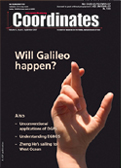
Nothing Succeed like Success! GSLV-F04 successfully launched – Places INSAT-4CR in Orbit
India’s Geosynchronous Satellite Launch Vehicle, GSLV-F04, had a successful launch on September 2, 2007. It placed India’s INSAT-4CR into the Geosynchronous Transfer Orbit. This was the fifth flight of GSLV and the fourth successful one.
GSLV was commissioned after both its developmental test flights conducted in April 2001 and May 2003 were successful. GSLV was designed and developed by Vikram Sarabhai Space Centre, Thiruvananthapuram, India. Russian supplied cryogenic stage was used for third stage propulsion, the guidance and control of the stage has been implemented by ISRO. INSAT-4CR was developed by ISRO Satellite Centre, Bangalore. The payloads were developed by Space Applications Centre, Ahmedabad. The successful launch of GSLV-F04 demonstrated the operational reliability of GSLV as well as reiterated the endto- end capability of ISRO.
http://www.isro.gov.in/gslv-f04/photos/index.htm

GIS to fi ght dengue epidemic in Bangkok
Authorities in Bangkok are resorting to a GIS to ease the dengue epidemic in the Thai capital. According to Bangkok governor, a longer rainy season and changing temperatures have favored the breeding of the mosquito that transmit the fatal disease. He added, the GIS will help the city officials to find critical epidemic areas. www.allheadlinenews.com

GPS technology aids biologists in research
Satellite tracking technology may help state biologists learn more about the habits of mountain goats while helping keep track of them. Two goats shall be the test animals for the tracking experiment, said officials of district wildlife biologist for the Oregon Department of Fish and Wildlife in Baker City. Biologists equipped two of the goats with GPS, collars programmed to pinpoint the goats’ position every 30 minutes for the next couple of months, then every three hours. They can adjust that interval to as often as every 10 minutes by remote control. The collars will also record temperatures. http://seattletimes.nwsource.com

Leica Geosystems introduces GMX902 GG GPS + GLONASS receiver
Leica Geosystems has introduced Leica GMX902 GG GNSS, a GPS + GLONASS receiver, developed to monitor sensitive structures and crucial topographies. It provides precise dual frequency code and phase data up to 20 Hz, enabling precise data capture as the basis for highly accurate position calculation and motion analysis.
Leica has also announced the further continuation ATHENA Program – a formalized purchase scheme designed to help Universities, Research Organisations and UNAVCO members to better facilitate the use of GNSS Reference Station and Structural Monitoring technology for both teaching and scientific research purposes. ATHENA stands for ‘Advanced Technology for Higher-Education and Non-profit Associations’ www.leica-geosystems.com

Will Galileo happen?
DR GUENTER HEINRICHS, MIGUEL ROMAY MERINO, JIM DOHERTY, F MICHAEL SWIEK, RONALD R HATCH
Understanding EGNOS
MELANIE VRITSCHAN, UMBERTO GUIDA, JON WESTBROOK
Unconventional applications with single frequency DGPS
RAJNEESH GUPTA, VIVEK BANSAL, BRIG M C DHAMIJA (RETD)
Zheng He’s sailing to West Ocean
JIN DING, CHAOJIAN SHI, ADAM WEINTRIT
The Global Map Experience
D R FRASER TAYLOR
India celebrates 60 years of independence.
We are happy once again.
A celebration for democracy and democratic values.
On the occasion, we take a look at two movements.
National Spatial Data Infrastructure and Sustainable …

US, EU agree on GPSGalileo compatibility
The United States and the European Union (EU) have announced a formal agreement to make respective global navigation satellite systems (GNSS)-GPS and Galileocompatible with one another. The European Commission (EC) said a joint working group had overcome technical challenges to design interoperable civil signals. Experts have agreed that a multiplexed binary offset carrier (MBOC) waveform will be used on both systems instead of the binary offset carrier, or BOC (1,1) waveform, as stated in a 1984 agreement between the United States and the EU. The MBOC signal was proposed by a technical working group to examine further refi nements to the design.
www.satnews.com

ISRO to launch Israeli Satellite
ISRO is planning to launch an Israeli satellite from Sriharikota which is expected to cost approximately $15 million. Israe has opted for the Indian PSLV as it is more reliable than its own Shavit rocket and also Israel’s defence ministry has laid down new orbital requirements for TechSar which Shavit could not provide.
http://timesofindia.indiatimes.com

Chief Surveyor of Singapore is first Asian to receive coveted spatial science award
The Department of Geomatics, University of Melbourne will be presenting its annual Thornton Smith Medal for 2007 to its fi rst Asian recipient outside of Australia. Mr Soh Kheng Peng, who is chief surveyor of Singapore, Singapore Land Authority.
The Medal commemorates Jim Thornton Smith who founded the Department of Geomatics at the University of Melbourne in 1949 and was instrumental in the formulation and introduction of the Bachelor of Surveying degree in 1948. The Medal is awarded to a graduate from the Department of Geomatics who has shown a high level of distinction and leadership in the discipline.










 (5.00 out of 5)
(5.00 out of 5)